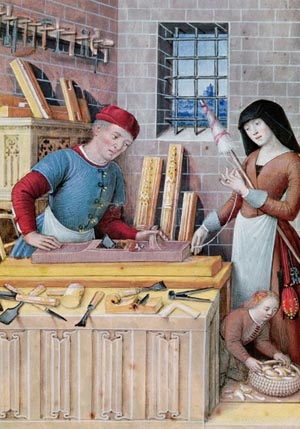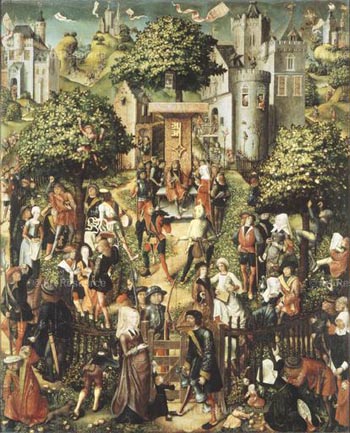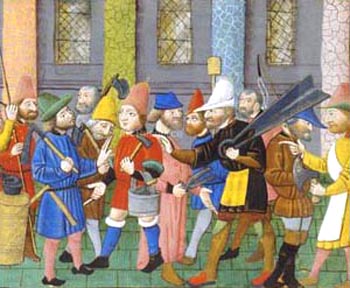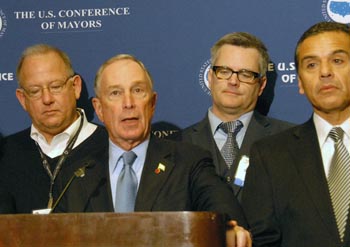 |
Socio-Political Issues
Liberalism, Socialism, Feudalism - VII
The Role of Local Authorities & Customs
Plinio Corrêa de Oliveira
Based on the descriptions we made of medieval feudalism founded on the principle of subsidiarity (here, here & here) we see that the social organization was composed of a large network of small cells that directed the life of man insofar as he needed direction, and that this network was interrelated and interdependent.
To give you the exact idea of the role of the authority in those times, you should imagine a man who has authority over just one street. Let us suppose that this is a street of carpenters: All the carpenters of the city live and work there; their guild is located there as well, and they elect a mayor to administrate their common interests.

A medieval carpenter/mayor lived on the street where he workand & carried out his office |
The mayor of that single street has much more personal contact with the people living there than any mayor of a large city. Imagine the mayor of São Paulo, who has authority over more than 15 million persons, and compare this with the mayor of this one street in a city in the Middle Ages. In a great metropolis today, most of the citizens who elect the mayor have no personal contact with him during the four years of his mandate. His authority is too distant from their daily lives.
But this did not happen in the case of the mayor of that one street. He lived on that street, he knew everyone in there, crossing their paths several times a day. When someone needed something - too much garbage has collected in front of his store, for example - he did not need to ask for an appointment or wait for his call to be returned.
He would simply walk to the mayor’s house and say: “Mr. Mayor, the garbage man Mr. Serapian forgot to clean the street in front of my store.” The mayor: “Is that so?” Then the two would go together to speak with Mr. Serapian, who also lived close by, and ask him to clean that area.
This mayor had a relationship with each one of his constituents that was close and personal. This is the strongest way to have influence in government. It is much more efficient for a man to influence his own street than to influence his State. He does not live in an abstract State, but he influences his city and his State through the inlfuence he has in his own street.
The result is that he would intervene in public affairs, in the direction of the public power, simply by contacting the person who exercised authority in his street or neighborhood, in the case of a small neighborhood.
This same procedure applies to other manual workers. If he has personal contact with the 20, 50 or 100 colleagues of his guild, he can go before them to expound his points of views, and these opinions have a weight. When it is time to elect a new president of that small guild, his vote has importance. My vote to elect a mayor of São Paulo, however, diluted in the millions and millions of other votes, is worth almost nothing.
A public power is strongly influenced by individual action in small groups. This is a form of democracy. Many of you come from countryside towns and know that in small towns the weight of each person is much more considerable than in the great cities. There is no comparison.
The role of customs in feudalism
Another democratic aspect of medieval society was the role of customs. Once a custom was established, it had a certain right. Imagine, for example, that a man from immemorial times had the habit of keeping his horse in a public place tied to a post outside the building where he lived. If this practice continued for two or three generations, no one else could violate that custom; it became an acquired right because it was implicitly approved by all; it had the effective value of a plebiscite. Thus, unless it were demonstrated to be harmful to the community, that custom would subsist. The man did not need to pay any fee to assure his right to tie his horse there. It was accepted by all.

The archers' guild, above, had its customs and laws
|
This is one example of how customs used to create certain rights for a person or family. This system went so far that some families had different customs of inheritance. To show their validity in court should they be contested, they need only prove that such was the custom of their family, and the judge would take that custom as the law and give his sentence accordingly.
In one region of France there was a curious custom of inheritance. Instead of leaving the inheritance to the eldest son, when the father would die the fortune of the family would go to the youngest. The persons of that region adopted this custom because they held that the youngest son would be better able than the eldest to fight and lead battles for a longer period of time. Hence, the inheritance was transmitted to him. So, when someone from that region would bring an inheritance case before the King to be judged, the King would take that custom into due consideration to issue a just sentence.
Therefore, the great majority of the laws were built on customs, which the King would only annul should they become unjust for some reason. Otherwise, the customs would be taken as law.
No professional politicians
An interesting byproduct of this system is that it had no room for professional politics. Let us return to the example of the man who was elected mayor of a street. He did not make that office a profession. He held the office and exercised its functions along with the job he already had. He was a carpenter, not a politician.

Local tradesmen and peasants at a meeting to discuss their views |
Another example: a feudal lord who governed the region encompassed by his lands. He was first of all a farmer, not a governor. He lived from his lands, and thus he was interested in making his area produce to meet his contract with his own lord from whom he had received his lands. He also had an interest in acquiring prestige among his peers and had to provide for his family. Only secondarily was he the governor of those lands. He was not, therefore, a professional politician.
Analogously, each person was a professional in his own field, and since each job has some adjoining political aspect, each one would intervene indirectly in politics by a similar process. All had a participation in the politics that concerned them, but the professional politician, like the ones we have today, did not exist.
Even those who were elected to public offices - a representative in the municipal chamber - did not hold the office as a fulltime job. The chamber would have one or two meetings per week. This small number of meetings was a consequence of the principle of subsidiarity. Since each neighborhood would govern itself, the municipal chamber did not have too much to do. Thus, an individual could not become a fulltime municipal politician. He needed to have another profession and only exercise his municipal office on the side. The political class did not exist.
Feudalism, better than Liberalism or Socialism

Today's mayors - professional politicians - are far removed from the daily lives of the people |
Therefore, the system inspired by the principle of subsidiarity was one that had neither the defects of Liberalism nor those of Socialism. In the medieval system, all had an influence on the State, but an influence that was linked to his immediate field of action and interest. Politics existed only in relation to the interests of the different professions and to the everyday life of everyone, in an atmosphere where each one was attending to the concerns of his own life.
This is profoundly different from how the liberal democratic State operates, where there is a class of politicians that exists to incessantly make laws and to hold public offices. From time to time, such office-holders are elected by an enormous mass of people. Those people do not know the politicians or each other and – except for in those elections – have no personal influence on what happens in the public domain.
The medieval system was much more democratic, in the good sense of the word. It was neither egalitarian nor liberal, but more democratic. On another occasion, I plan to demonstrate that the medieval system had, nonetheless, a legitimate equality and a legitimate liberty.

Posted June 8, 2012

Related Topics of Interest
 The Principle of Subsidiarity The Principle of Subsidiarity
 Subsidiarity and Feudalism Subsidiarity and Feudalism
 The Medieval Family & Subsidiarity The Medieval Family & Subsidiarity
 Customary Law & Roman Law Customary Law & Roman Law
 Customary Law, the Foundation & Charm of a Catholic State Customary Law, the Foundation & Charm of a Catholic State
 How Intermediary Societies Participate in the State Power How Intermediary Societies Participate in the State Power
 Proportion between the City and the Man Proportion between the City and the Man
 The Organic Formation of a Region The Organic Formation of a Region
 The Art of Organic Government The Art of Organic Government

Related Works of Interest
|
|
Social-Political | Hot Topics | Home | Books | CDs | Search | Contact Us | Donate

© 2002- Tradition in Action, Inc. All Rights
Reserved
|
 |
|